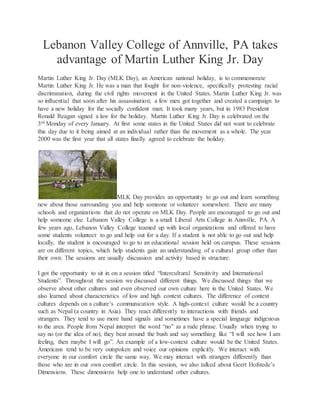
Project Interfaith Blog
- 1. Lebanon Valley College of Annville, PA takes advantage of Martin Luther King Jr. Day Martin Luther King Jr. Day (MLK Day), an American national holiday, is to commemorate Martin Luther King Jr. He was a man that fought for non-violence, specifically protesting racial discrimination, during the civil rights movement in the United States. Martin Luther King Jr. was so influential that soon after his assassination; a few men got together and created a campaign to have a new holiday for the socially confident man. It took many years, but in 1983 President Ronald Reagan signed a law for the holiday. Martin Luther King Jr. Day is celebrated on the 3rd Monday of every January. At first some states in the United States did not want to celebrate this day due to it being aimed at an individual rather than the movement as a whole. The year 2000 was the first year that all states finally agreed to celebrate the holiday. MLK Day provides an opportunity to go out and learn something new about those surrounding you and help someone or volunteer somewhere. There are many schools and organizations that do not operate on MLK Day. People are encouraged to go out and help someone else. Lebanon Valley College is a small Liberal Arts College in Annville, PA. A few years ago, Lebanon Valley College teamed up with local organizations and offered to have some students volunteer to go and help out for a day. If a student is not able to go out and help locally, the student is encouraged to go to an educational session held on campus. These sessions are on different topics, which help students gain an understanding of a cultural group other than their own. The sessions are usually discussion and activity based in structure. I got the opportunity to sit in on a session titled “Intercultural Sensitivity and International Students”. Throughout the session we discussed different things. We discussed things that we observe about other cultures and even observed our own culture here in the United States. We also learned about characteristics of low and high context cultures. The difference of context cultures depends on a culture’s communication style. A high-context culture would be a country such as Nepal (a country in Asia). They react differently to interactions with friends and strangers. They tend to use more hand signals and sometimes have a special language indigenous to the area. People from Nepal interpret the word “no” as a rude phrase. Usually when trying to say no (or the idea of no), they beat around the bush and say something like “I will see how I am feeling, then maybe I will go”. An example of a low-context culture would be the United States. Americans tend to be very outspoken and voice our opinions explicitly. We interact with everyone in our comfort circle the same way. We may interact with strangers differently than those who are in our own comfort circle. In this session, we also talked about Geert Hofstede’s Dimensions. These dimensions help one to understand other cultures.
- 2. As we were talking about these topics during the session, I thought there had to be a way that this relates to religion. After some thought, I realized there was an obvious connection between culture and religion. Religion is imbedded into culture. All around the world you will find that different countries have different ways of going about their daily routine or of interacting with one another. For example, someone in the Islamic culture would say, “assalamu alikum”, as a greeting. This is used to bring Muslims together and makes the bonds between them greater. There is a lot to learn about religions that are not the same as your own. There are many good sources to help you understand other practices. Share what you learn about religions with others! Links to learn more about: Context Cultures: http://www.culture-at-work.com/highlow.html Cultural Dimensions: http://geert-hofstede.com/dimensions.html Project Interfaith Conversation Kits to help you talk about religion and other topics! http://projectinterfaith.org/page/online-store-menu Elizabeth Zeiner is a new member to the Project Interfaith team. She is one of two Communications Interns. She is currently attending Lebanon Valley College, located in Annville, Pennsylvania, where she is a Religion Major with a Sociology Minor. She is a senior and will be graduating in May 2015. Elizabeth has been involved with communities aside of her own and has traveled to various countries, such as Ecuador, Puerto Rico, Jamaica, Switzerland, Hungary, France, and Italy. Traveling to all these places and gathering information from Lebanon Valley’s religion classes have helped her gain greater knowledge of the religious and cultural traditions throughout the world. Elizabeth has also attained an Interfaith Certification through Lebanon Valley College. Elizabeth hopes that the experience of working with Project Interfaith will help her learn more about the world of religions surrounding her as well as gain more knowledge about non-profit organizations.